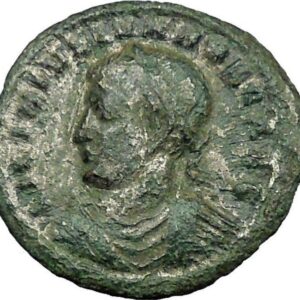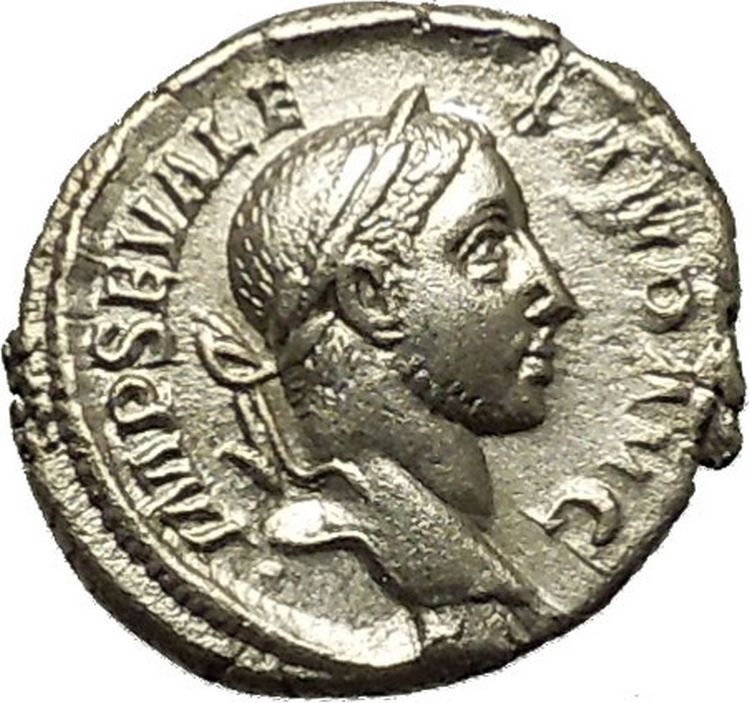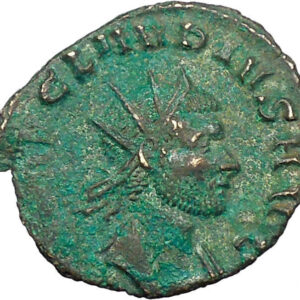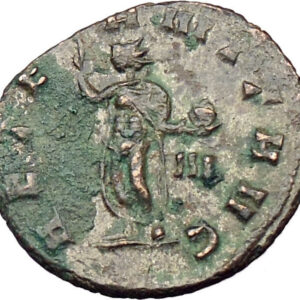|
Quintillus – Roman Emperor: 270 A.D.
Bronze Antoninianus 17mm (3.56 grams) Rome mint, struck 270 A.D.
Reference: RIC 19 ; Alföldi 20
MP CM AVR CL QVINTILLVS AVG, radiate, draped bust right.
FORTVNA REDVX, Fortuna standing left, holding rudder on globe and cornucopiae. S in exergue.
You are bidding on the exact item pictured, provided with a Certificate of Authenticity and Lifetime Guarantee of Authenticity.
In Roman mythology, Fortuna (equivalent to the Greek goddess Tyche) goddess of fortune, was the personification of luck; hopefully she brought good luck, but she could be represented veiled and blind, as modern depictions of Justice are seen, and came to represent the capriciousness of life. Atrox Fortuna claimed the lives of Augustus’ two hopeful grandsons, educated to take up princely roles, for she was also a goddess of fate. Her father was Jupiter, and though she had no lovers or children of her own, Fortuna was propitiated by mothers.
Fortuna had a retinue that included Copia, “bounty”, among her blessings. Under the name Annonaria she protected grain supplies. In the Roman calendar, June 11 was sacred to Fortuna, with a greater festival to Fors Fortuna on the 24th.
Roman writers disagreed whether her cult was introduced to Rome by Servius Tullius. or Ancus Marcius. Fortuna had a temple in the Forum Boarium and a public sanctuary on the Quirinalis, as the tutelary genius of Roma herself, Fortuna Populi Romani, the “Fortune of the Roman people”, for Fortuna, the embodiment of the chaotic chance event as modern historians would see it, was closely tied by the Romans to virtus, strength of character; flaws in the main public actors brought on the calamities of ill fortune, as Roman historians like Sallust saw her role: “Truly, when in the place of work, idleness, in place of the spirit of measure and equity, caprice and pride invade, fortune is changed just as with morality”.
Quintillus (Latin: Marcus Aurelius Claudius Quintillus Augustus; c. 210 – April 270) was Roman Emperor for a few months in 270.
Quintillus was born at Sirmium in Pannonia Inferior. Originating from a low-born family, Quintillus came to prominence with the accession of his brother Claudius II Gothicus to the imperial throne in 268. Quintillus was possibly made Procurator of Sardinia during his brother’s reign. He was declared emperor either by the Senate or by his brother’s soldiers upon the latter’s death in 270.[citation needed]
Eutropius reports Quintillus to have been elected by soldiers of the Roman army immediately following the death of his brother. The choice was reportedly approved by the Roman Senate. Joannes Zonaras reports him elected by the Senate itself. Records however agree that the legions which had followed Claudius in campaigning along the Danube were either unaware or disapproving of Quintillus’ elevation. They instead elevated their current leader Aurelian as emperor.
Quintillus committed suicide by slitting his wrists (September AD 270).
Reign of Quintillus
The few records of Quintillus’ reign are contradictory. They disagree on the length of his reign, variously reported to have lasted as few as 17 days and as many as 177 days (about six months). Records also disagree on the cause of his death. Historia Augusta reports him murdered by his own soldiers in reaction to his strict military discipline.[8] Jerome reports him killed, presumably in conflict with Aurelian.[9] John of Antioch and Joannes Zonaras reported Quintillus to have committed suicide by opening his veins and bleeding himself to death. John reports the suicide to have been assisted by a physician. Claudius Salmasius noted that Dexippus recorded the death without stating causes. All records however agree in placing the death at Aquileia.
Quintillus was reportedly survived by his two sons.
The Historia Augusta reports Claudius and Quintillus having another brother named Crispus and through him a niece, Claudia, who reportedly married Eutropius and was mother to Constantius Chlorus. Some historians however suspect this account to be a genealogical fabrication to flatter Constantine I.
Surviving Roman records considered Quintillus a moderate and capable Emperor. He was seen as a champion of the Senate and thus compared to previous Emperors Galba and Pertinax. All three were highly regarded by Senatorial sources despite their failure to survive a full year of reign.
|










